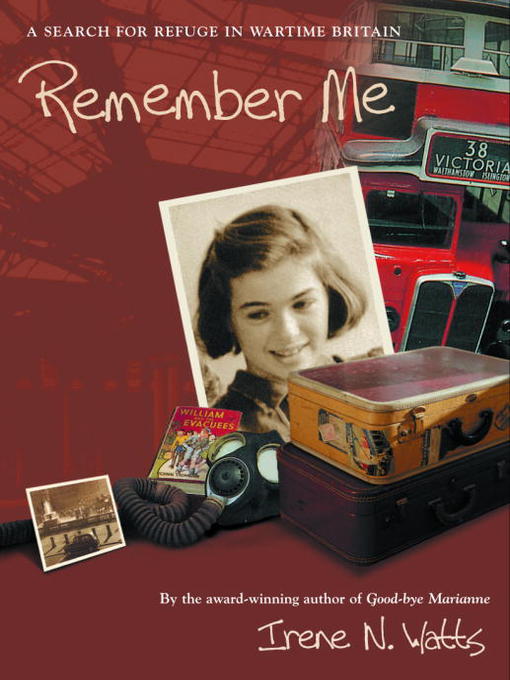At first Marianne is desperate. She does not speak English, she is not welcome in her sponsors’ home, and, most of all, she misses her mother terribly. As the months pass, she realizes that she cannot control the circumstances around her. She must rely on herself if she is to survive.
In this exciting companion to Good-bye Marianne, Irene N. Watts has created a memorable character, and a story that is ultimately about hope, not war. Based on true events, this fictional account of hatred and racism speaks volumes about history and human nature.
-
Creators
-
Publisher
-
Release date
February 21, 2012 -
Formats
-
Kindle Book
-
OverDrive Read
- ISBN: 9781770490512
-
EPUB ebook
- ISBN: 9781770490512
- File size: 1893 KB
-
-
Languages
- English
-
Levels
- ATOS Level: 4.5
- Interest Level: 4-8(MG)
- Text Difficulty: 3
-
Reviews
-
School Library Journal
January 1, 2001
Gr 5-7-In this sequel to Good-bye, Marianne (Tundra, 1998), Watts continues the story of a young Jewish child living in Berlin in 1938. As the book opens, Marianne is on a train to London with the first Kindertransport, a rescue operation for children that would eventually remove approximately 9300 refugees from Germany, Austria, Poland, and Czechoslovakia. Upon her arrival, the 11-year-old is situated in the first of a series of foster homes that go from bad to worse. Initially placed with a couple looking for a domestic, she is lonely and homesick. As war threatens England, she is evacuated to Wales with a large group of British children. Life doesn't get any easier in this small town: Marianne is accused of spying, meets with a great deal of anti-Semitism, and is billeted with a couple who view her as a replacement for their deceased daughter. In the end, Marianne proves to be lucky; her mother arrives in England, and she is one of the few children from this operation ever to see a parent again. While Watts leans toward the melodramatic, with Marianne facing horrific situations at every turn, the subject is an important part of Holocaust history and would be useful if combined with a nonfiction work, such as Anne Fox's Ten Thousand Children (Behrman House, 1998).-Betsy Fraser, Calgary Public Library, CanadaCopyright 2000 School Library Journal, LLC Used with permission.
-
Booklist
December 1, 2000
Gr. 5-8. Like Olga Drucker's "Kindertransport" (1992), this historical novel focuses on one child to tell the story of the organized rescue of 10,000 Jewish children who were sent by their parents from Europe to safety in Britain at the beginning of World War II. Marianne's parting from her mother in Berlin is anguished, and the 11-year-old never stops missing her family. As a refugee in London, then in a Welsh mining town, she's desperately unhappy at home and at school. At first she doesn't speak English, and most people know little about the horror she's left behind. Some don't like Jews, and no one likes Germans. "Is it all going to start again? Even here," Marianne wonders. True to the child's point of view, the narrative conveys the bewilderment and sorrow of a child suddenly alone in a world of strangers. With a film on the Kindertransport scheduled soon, this book will be of particular interest. (Reprinted with permission of Booklist, copyright 2000, American Library Association.) -
School Library Journal
November 1, 2002
Gr 5-7-In this sequel to Good-bye, Marianne (Tundra, 1998), Watts continues the story of a young Jewish child living in Berlin in 1938. As the book opens, Marianne is on a train to London with the first Kindertransport, a rescue operation for children that would eventually remove approximately 9300 refugees from Germany, Austria, Poland, and Czechoslovakia. Upon her arrival, the 11-year-old is situated in the first of a series of foster homes that go from bad to worse. Initially placed with a couple looking for a domestic, she is lonely and homesick. As war threatens England, she is evacuated to Wales with a large group of British children. Life doesn't get any easier in this small town: Marianne is accused of spying, meets with a great deal of anti-Semitism, and is billeted with a couple who view her as a replacement for their deceased daughter. In the end, Marianne proves to be lucky; her mother arrives in England, and she is one of the few children from this operation ever to see a parent again. While Watts leans toward the melodramatic, with Marianne facing horrific situations at every turn, the subject is an important part of Holocaust history and would be useful if combined with a nonfiction work, such as Anne Fox's Ten Thousand Children (Behrman House, 1998).-Betsy Fraser, Calgary Public Library, CanadaCopyright 2002 School Library Journal, LLC Used with permission.
-
Formats
- Kindle Book
- OverDrive Read
- EPUB ebook
Languages
- English
Levels
- ATOS Level:4.5
- Interest Level:4-8(MG)
- Text Difficulty:3
Loading
Why is availability limited?
×Availability can change throughout the month based on the library's budget. You can still place a hold on the title, and your hold will be automatically filled as soon as the title is available again.
The Kindle Book format for this title is not supported on:
×Read-along ebook
×The OverDrive Read format of this ebook has professional narration that plays while you read in your browser. Learn more here.


